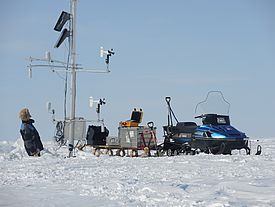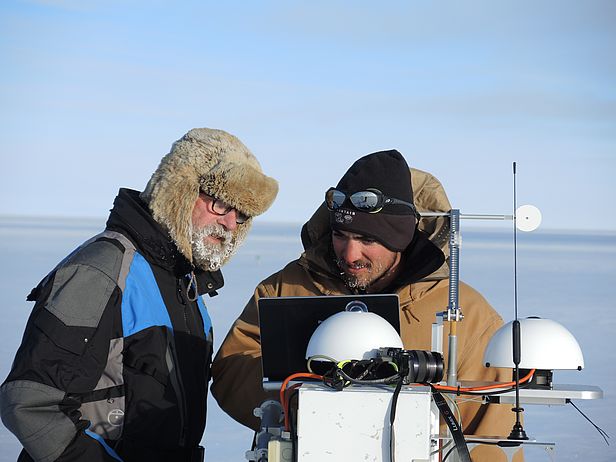For 30 years, researchers operated a network of weather stations on Greenland in harsh conditions. The dataset from this highly relevant climate research has now been reprocessed and published in a study. The publication is also an appreciation of the lifework of former WSL director Prof. Dr. Konrad Steffen, who died in an accident on Greenland in 2020.
The measurement network on Greenland has led to an extremely valuable set of data on climate change in the far north. A group of researchers has reprocessed the dataset and published it in the journal Earth System Science Data. The data can now be used for further climate research. Since 2020, the Geological Survey of Denmark and Greenland (GEUS) manages the network of measuring stations.
In the 1990s, the former WSL director Konrad (Koni) Steffen set up the ETH/CU research camp on Greenland, informally known as Swiss Camp. Koni Steffen became WSL director in 2012 and was the key figure in developing and supervising the camp’s measurement network. While Koni Steffen was a constant on Greenland, dozens of researchers contributed to the measurements consecutively. The data processing systems also changed over the years. To harmonize the measurements, it was necessary to reprocess the data. The authors of the study have documented their procedure transparently. This makes it easier for other researchers to use the data. To promote the use of the data, a focus was also put on making it publicly accessible. Thanks to the reprocessing, a publicly available dataset of the entire measurement series exists for the first time. This allows researchers to analyze which climate models are closest to reality and make long-term forecasts.
Effects of climate change particularly prevalent on Greenland ¶
The Greenland Ice Sheet is not only a relevant cooling element for the global climate, but it also reacts strongly to climate change. The ice sheet is therefore crucial to understanding the effects of climate change. The Swiss Camp had 31 automatic weather stations that measured temperature, air pressure, wind, radiation intensity, and humidity. The stations made it possible to record the longest time series of meteorological data on Greenland. The data collected shows a clear warming trend and is of global relevance for further climate research.
In memory of Koni ¶
In scope of the publication of the measurement series, we spoke to Derek Houtz, co-author of the study and researcher at WSL, about Koni Steffen and his life work.
FF: Derek Houtz, you went to Greenland with Koni Steffen many times. How did you experience working with him?
DH: I loved working with Koni. I thought he was a great leader. You were just naturally motivated to work hard because he set a good example. A lot of people would say he had espresso running through his hands because his hands would never get cold, and he would also never drink water, he only drank espresso. So the experience was great, I miss it.
FF: What was your highlight?
DH: There were a lot of highlights. Once we had to land on a glacier that is known to have a lot of bare ice, so it was hard to land. In 2014, they flew too low and touched the ski down on the left side. The left wing dove into the ice and got bent up. So we could not go anywhere and had to wait for rescue for 48 hours. We only had a box of dry pasta, chocolate, and whisky to survive on (laughs). But we felt comfortable and safe, there was no danger. That was one of the more memorable times.
FF: And the data you collected, what would Koni have wished for its further use?
DH: Koni was always happy to have users of his data. You had to request the download of his data, but he never disapproved of anyone, he just wanted to see who was actually using it. I think he had the mentality of maintaining his stations so that his research could get the maximum use from others. He co-authored many papers in that way, but it was never his intent to build up his publications, he wanted the results to be known. He was also active in getting the message of climate change out there. Like having Doris Leuthard, Al Gore, and Nancy Pelosi to Swiss Camp to show them what we are dealing with. He saw it as his responsibility as a scientist to do the science and then the decision makers hopefully look at the facts and make decisions.
Always up to date: Subscribe to the WSL Newsletter
Contact ¶
Publication ¶
Copyright ¶
WSL and SLF provide image and sound material free of charge for use in the context of press contributions in connection with this media release. The transfer of this material to image, sound and/or video databases and the sale of the material by third parties are not permitted.



